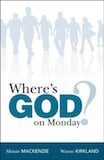Introduction: Where’s God on Monday?
Book / Produced by Individual TOW Project member
Roger is a workaholic. He wouldn’t admit it, but his life certainly bears the fruit of it. Roger is also a Christian and feels a deep sense of call to his profession – law. The work of a demanding practice means that 70-to-80-hour weeks are the norm for Roger. But he also contributes in the church that he and his family is a part of. He’s on several committees, leads worship and a home group, and is prominent in many other ways.
People who know Roger certainly esteem him highly. He’s incredibly busy doing important work, making a major contribution to God’s kingdom. At least that’s what both Roger and his friends believe.
But there’s another side to him, which is not so obvious. Roger finds it difficult to say no. He’s desperate for people’s approval and affirmation and, as a result, is close to burn-out. So is his family. His wife Colleen is resigned to things always being this way, even in “retirement”. She copes as best she can and carries the extra load in parenting and household tasks. Secretly she dreams of getting off the treadmill they’re on, but deep down she knows Roger would either quickly die … or find another equally demanding treadmill to leap onto!
Karen is married to Steve and is mother to three growing boys. Before having children she was a secretary in a busy office. Highly skilled, she used to find conversation easy at dinner parties and when meeting new people.
But now, several years on, she doesn’t know what to say when people ask, “Do you work?” Though she uses the positive reply, “I’m a fulltime mother,” she detects a certain lack of interest – sometimes almost disparagement. Not only does Karen believe she is undervalued by her peers for a task she feels passionately about, but there is no easy way to describe the myriad of other ways she contributes during the week – like the voluntary work at school, in the community and through friendships.
On top of all of this, Karen is feeling no small amount of peer pressure to “get a job” – like all of her friends who are now “going back to work”. However, she and Steve both feel that the time is not right, and that the benefits of having one of them at home for the children are worth the cost.
Joseph works in a bank, but he’s not intending to stick around too long. He’s frustrated by the limitations put on his witness, and has plans to get into “fulltime Christian service”. He feels called to pastoring and regards the job at the bank as a way to earn the dollars needed to go to Bible college.
Joseph has been particularly inspired by a couple of visiting preachers who’ve encouraged him to “aim high” and not settle for second-best. He could be so much more effective for the Lord, he feels, by giving all his time and energy to pastoring. The elders in his church have been very supportive of this aim, giving him opportunity to try his hand at preaching and involving him in other areas of leadership within the church.
Mark faces a dilemma. He’s a middle manager, and the demands his employer is placing on him are getting bigger every year. More responsibility, harder deadlines, better results – these are what the bosses seem to be after.
Trying to add family commitments (he has a wife and two young children) and church involvement, is creating an unbearable burden. Already he leaves home at 6.45am to beat the rush-hour traffic, and gets home around 7pm, just in time to put the kids to bed. He regularly takes work home nights and weekends.
Mark is caught in a bind. He knows that if he slackens off on his “work” his job will be at risk. But the worst thing is that his job is so all-consuming. Outside of “work hours” he finds it difficult to give people his full attention. He just doesn’t have the energy for proper preparation of his home-group sessions, or for spending time with his kids and wife … much less getting involved in a club or community activity.
He feels guilty about all this, but doesn’t know what to do. Church doesn’t help – particularly Sunday services, which seem totally unrelated to his “real life”, almost as if they’re in a different world.
Julie is unemployed. At least that’s how the Department of Statistics lists her.
It hasn’t always been this way. Five years ago she was made redundant and hasn’t been able to find a job since. Julie suspects it’s because of her age. No one really wants to employ a 58-year-old. In spite of her best attempts to keep positive, five years of job interviews, rejection letters and telling people she’s “between jobs” have worn her down. Julie is now hanging out for retirement.
Sadly, her confidence and self-esteem are so undermined that she doesn’t see how much potential there is for her to contribute on a voluntary basis. Her skills would be snapped up by church or community organizations, but she is careful not to get actively involved in the ones she has links with. Julie regards them more as a “fill-in” – second-best to a “real job”.
The Sunday-Monday split
Five people – all Christians, struggling with what it means to work and follow Jesus.
The issues are many – and complex. This book seeks to give some perspectives for the Karens and Marks and Rogers – and many others who genuinely want to be faithful to Jesus in all they do, yet struggle to know how to do this in their daily work.
They are representative of hundreds of Christians we have spoken with over the years. In fact, the Epilogue to this book shares how many of these conversations have contributed to us writing this book.
The sad truth is that much of our church life completely ignores the subject of daily work, as if what people do for most of their week has little connection with their faith. As Calvin Redekop has noted, the truth is that the average Christian spends less than 2 percent of his or her waking time at church and most of their time working. Yet the church puts most of its energy and resources into that 2 percent and very little into the world of daily work.
Work is the dominant activity of our everyday lives and yet so often our work and worship end up having little to do with each other. An enormous chasm lies between the worlds of Sunday and Monday.
So much for the problem. What about some solutions?
Where’s God on Monday? is a starting point. It grapples with some of the issues – from a biblical perspective. And it’s not some pie-in-the-sky theologizing we’re aiming for, but rather, intensely practical and tangible outworkings for our day-to-day work.
To help you unearth matters in your own work context, we’ve developed some exercises and questions at the end of each chapter. They are useful for both individual and group reflection.
However, before we go any further, there’s a fundamental issue we need to address: how we understand and use the word “work”.
Who is working?
Imagine this scene: It’s 6pm and John walks through walks in through the front entrance of the house he shares with Liz, his wife, and their three children. He puts down his briefcase and Liz immediately gives him a kiss, inquiring, “How was your day at work, dear?”
John automatically knows what his wife is asking. He’s employed as an accountant for forty hours a week at a firm downtown. Liz is asking him how his paid job went today. After a short commentary on the office politics and a struggle sorting out a client’s books, John returns the favor by asking Liz, “So how was your day at home?”
John never thinks to ask, “How was your day of work at home?” Liz knows she has also been working today. And we hope John doesn’t think she has just been lazing around or resting while he’s been gone! Taking care of three young active boys, looking after the house and the meals, volunteering at the boys’ school – all these activities have filled Liz’s day. Liz has actually been working hard but the words John uses don’t overtly acknowledge this.
Unfortunately, when we use the word “work” we usually refer to paid employment. However, for most people this is only part of their daily work and for others like Liz, their work doesn’t include any paid work at all. Sadly, the value of “paid” work is generally assumed to be of much greater importance than any unpaid tasks or roles we perform. This is not how it should be.
A cultural dilemma
When it comes to defining work in our culture, we have a real problem. The word “work” has become almost totally defined by paid employment. When we meet someone for the first time, and that person asks what we “do”, we usually reply, “I’m a builder” or “I work for Telecom”. Instinctively we know that the question really means, “What is your paid employment?”
More than anything else, the matter of “employment” defines who we are in the eyes of our culture. Yet, as Christians, do we really believe that? Surely there are more important ways of identifying who we are. And what about those who, for any reason, don’t have a paid job? They will tell you (and if you are such a person you will know only too well) that this question is disturbingly awkward to answer. Worse, it raises fearful questions about their own self-worth which many people are unable to face up to.
Defining “work” biblically
This narrow view of work is problematic when we come to examining the scriptures. The biblical writers lived in a tightly connected and closely integrated society. Their life was one where home and employment, relationships and activities were not separate spheres, but had real and obvious everyday connections.
Our fragmented and highly compartmentalized world doesn’t connect well with that society. If we are to read the scriptures with an understanding of their full meaning, we need to develop a much broader, holistic definition of work. Here are a couple of examples of people attempting to do this.
Paul Marshall defines work as “human activity designed to accomplish something that is needed, as distinct from activity that is satisfying in itself.” [1]
John Stott suggests that work is “the expenditure of energy (manual or mental or both) in the service of others, which brings fulfillment to the worker, benefit to the community and glory to God”.[2]
There are obviously a number of ways to nail down what we mean by work. Let’s not get hung up on the detail, but simply note that by seeing work as much broader than paid employment we will understand more thoroughly the biblical references to this topic.
Am I working when I read to my daughter in bed? In a sense I am. I may find it dull and unstimulating – or pleasant and fulfilling. Either way there’s a degree of expended energy involved, and it’s a very important task in the overall goal of raising and discipling my daughter.
What about when I attend a school or community committee? Or when my elderly neighbor needs help with her groceries? Or when a friend has just lost a brother through death and needs someone to be there – to sit with him and listen?
You bet! Some may be instinctive responses to people in need, others may be quite deliberately planned; some may seem effortless and “self-rewarding”, others may be a real chore and require major application … but all of these “tasks” are work.
Students work. Superannuants work. Stay-at-home parents work. “Unemployed” people work. We all work. It’s the dominant activity of our everyday lives, consuming the majority of our waking hours.
Whether or not we get paid for the task is somewhat irrelevant – at least insofar as whether it counts for work. So over the next few pages, when you read the word “work”, make sure you include all productive activities you engage in on a weekly basis.
Up Close and Personal
Which statements from the five profiles above do you identify with? (You might like to read them through again and underline anything that sounds like you.)
What conflicts are you aware of at the moment between your church life and your everyday activities?
As a group, try to come up with a definition of work that satisfies everyone.
When someone asks you what you “do”, what do you usually say? Is it difficult or easy for you to answer this question when you are asked? What are practical ways you could change the way you think and talk about “work”, to incorporate a wider definition of it?
If Jesus joined you each week and worked alongside you in your Monday-to-Saturday activities (remember: he was a tradesman himself), would that make any difference to the way you do your daily work? What sort of difference?
Share with your group members the list you have made in the Exercise below. As people read their lists, take care to notice the diversity of their activities.
Exercise
Make a list of all the tasks you do and the roles you play in a standard week. Be sure to cover all the paid and unpaid tasks – including domestic chores, community and church involvement, parenting etc. (Note: subsequent exercises in this book will regularly refer back to this list, so make sure you take time to be as comprehensive as possible.)
Which of these tasks do you normally refer to as “work”? Why these ones and not the others on the list?
Choose two tasks from your list that you enjoy most, and two you enjoy least. Why the difference?


.jpg)








